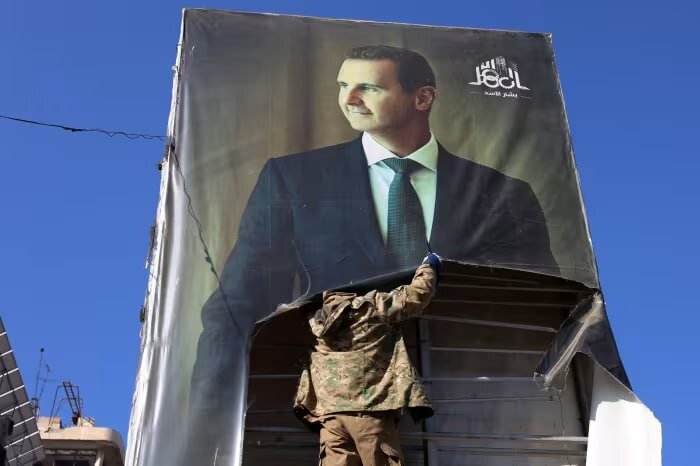Assad gone, Syria in twilight
The Syrian PM is set to supervise state bodies until the transition

TEHRAN - The fall of the Syrian government has underscored the precarious future of the Mediterranean country amidst the ongoing chaos.
Armed groups, led by Hayat Tahrir al-Sham (HTS) which controlled much of northwest Syria for years, launched a surprise offensive on November 27.
They seized some major cities and towns, including Aleppo, Hama and Homs and entered the capital Damascus early Sunday.
Armed men appearing on Syria’s state TV announced the overthrow of President Bashar Assad. The president is believed to have left the country for an undisclosed location.
HTS leader Abu Mohammed al-Jolani said on Sunday that state institutions will be supervised by Prime Minister Mohammed Ghazi Jalali until they are handed over.

Concerns are growing that Syria could be transformed into a theater for foreign powers seeking to exploit the chaos in the country.
Some regional and Western countries have welcomed the toppling of the Syrian government. Some people in Syria have also celebrated Assad’s ouster.
Nonetheless, concerns are growing amid a chaotic situation in the country.
According to the Associated Press, people in Damascus have rushed to stock up on supplies. It reported that many shops in the capital have been shuttered and those still open have run out of staples such as sugar. Items have also been sold at three times the normal price.
The AP also said thousands of others have gone to Syria’s border with Lebanon, trying to leave the country. But Lebanese border officials closed the main Masnaa border crossing late Saturday.
Recent developments in Syria have turned the spotlight on possible scenarios that could unfold.
Frist of all, the role of armed groups in determining Syria’s future should come under close scrutiny.
The HTS has its origins in al-Qaida and is considered a terrorist organization by the United States and the United Nations. But, al-Jolani has sought to transform the group’s public perception by cutting ties with al-Qaida. He has promised to embrace pluralism and religious tolerance.
Al-Jolani’s pledges and remarks have aroused suspicions.
Al-Qaida and ISIL, also known as ISIS and Daesh, perpetrated heinous crimes in Syria in the wake of the unrest in the country that followed the 2011 Arab Spring.
Al-Jolani’s gestures seem to be a PR stunt with the aim of distracting from the past behavior of his group’s members.
The HTS rule may lead to the resurgence of terrorists and extremists who wreaked havoc in the region for years.
Second, the power vacuum created by the collapse of the Assad government could result in civil war. The absence of a stable central government could pit Syrians against each other, plunging the country into absolute chaos. This might result in major bloodshed with regional consequences.

The Wall Street Journal revealed in 2015 that Israel opened its borders with Syria to provide medical treatment to terrorists affiliated to al-Qaida and its offshoot Nusra Front.
Third, armed groups would have never been able to launch their lightening offensive and seize territory in Syria without foreign support.
Turkey is among the countries that stand accused of aiding and abetting the HTS. The government of President Recep Tayyip Erdogan is pursuing geopolitical objectives in Syria.
Besides, Ankara does not want to see the Syrian Democratic Forces (SDF), which are mainly made up of Kurdish fighters, gain more territory in Syria. The Eurasian country is also grappling with the high number of Syrian refugees in the country. Turkey has been hosting millions of Syrian refugees over the past years. The Erdogan government now wants to return the refugees to Syria to provide some relief to the Turkish economy.
But it remains unclear whether the HTS rule will help Turkey achieve its objectives.
Israel along with some of the Persian Gulf countries and Western states have also supported anti-Syria militant groups such as the HTS.
Consequently, Syria may turn into a theater for foreign powers seeking to exploit the chaos, yet the Syrian populace will bear significant costs of such interventions.
Fourth, resentment against Israel over its genocidal war in Gaza has been on the rise across the globe. But the HTS and its allies have yet to publicly state their stance regarding Israel.
Militants that occupied parts of Syria following the chaos created by the Arab Spring, did not fire a single bullet toward Israel.
In 2015, The Wall Street Journal revealed that Israel opened its borders with Syria in order to provide medical treatment to terrorists affiliated to al-Qaida and its offshoot Nusra Front who had been wounded in fighting.
The prominent American newspaper reported at that time that the Nusra Front "hasn't bothered Israel since seizing the border area last summer" along the Golan Heights.
The Nusra Front was formed in 2012 by ISIL from which it split a year later and declared allegiance to al-Qaeda.
It severed ties with al-Qaeda and joined with other factions to rebrand as HTS in 2017.
For now, the reluctance of the HTS to adopt a tough position towards Israeli crimes demonstrates that there is honor among thieves!
If the HTS decides to transform Syria into an Israeli vassal, people will not remain silent in the face of rising anti-regime sentiment.
Presently, the writing is on the wall for regional and international actors who have made miscalculations as well as those who are walking on the air in the face of the overthrow of President Assad.
Failure to form an inclusive government in Syria will create a powder keg, the consequences of which will spill over into the entire region.
Such repercussions will deal serious blows to the interests of regional countries. Undoubtedly, turmoil in West Asia will adversely impact the interests of Western countries including the United States.
